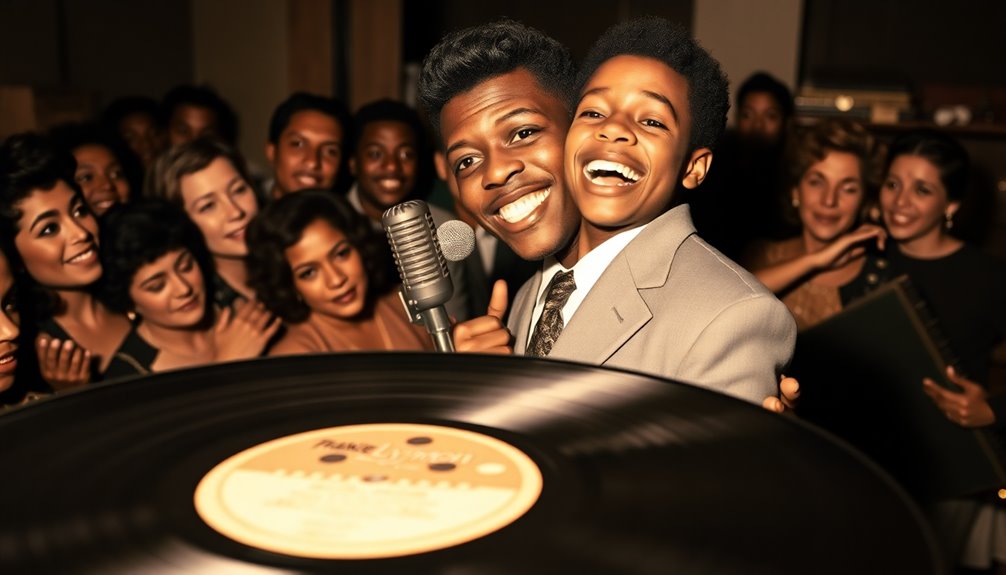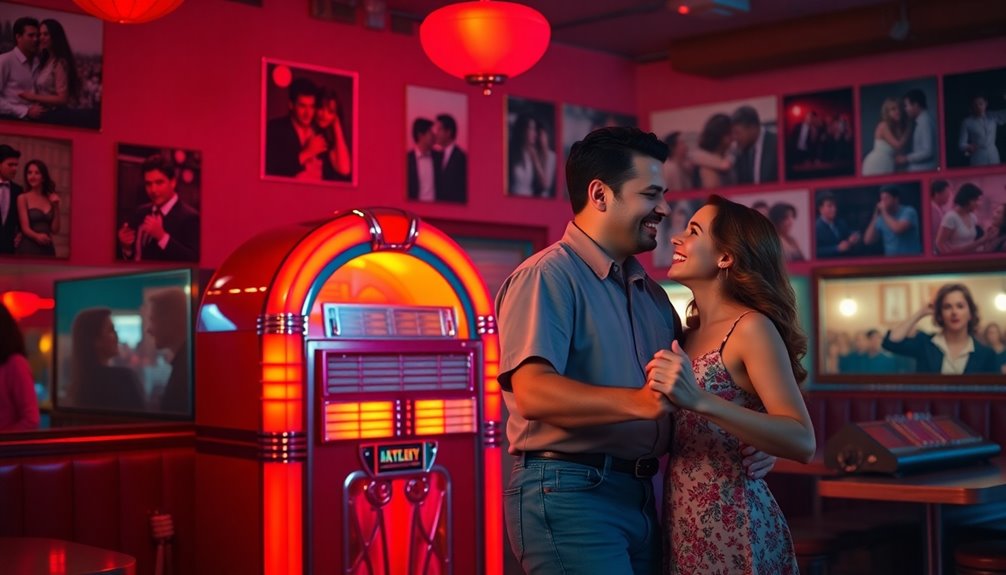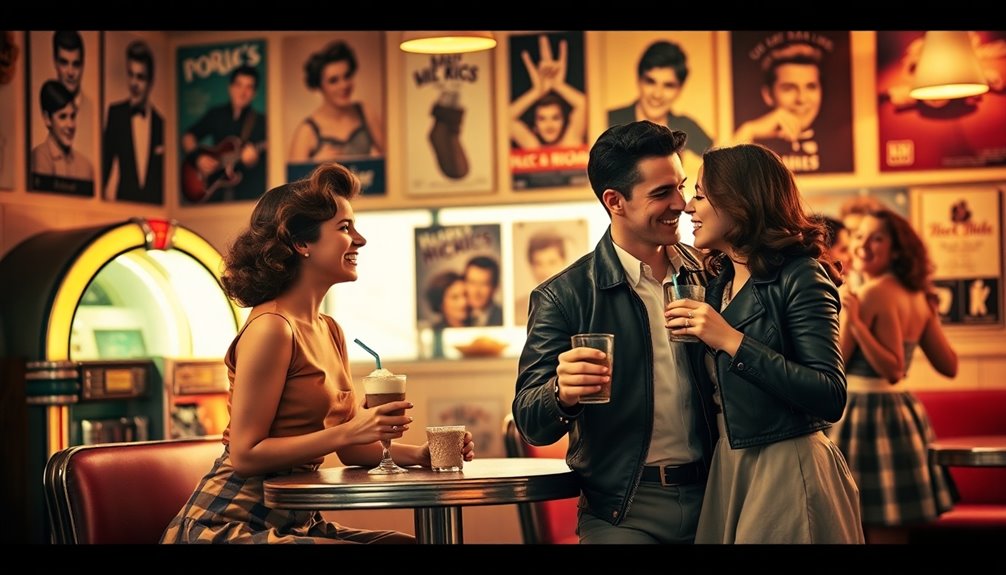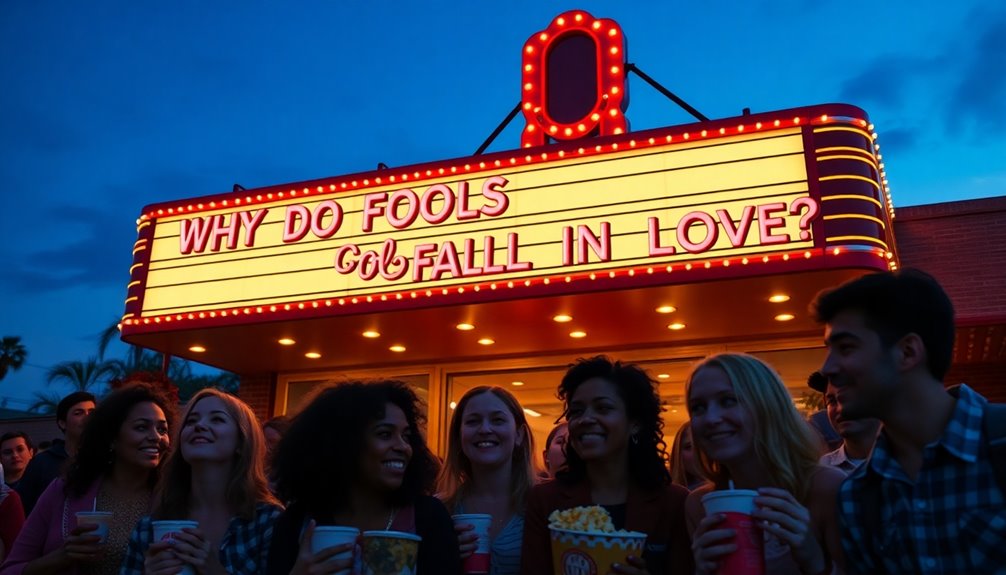The 1998 film "Why Do Fools Fall in Love" captivates you by exploring love's complexities through the life of Frankie Lymon. Its Rashomon-style narrative offers different perspectives, showcasing the women who loved him while highlighting the emotional toll of fame. Although the performances may lack depth, the film features iconic doo-wop songs that evoke nostalgia for the vibrant 1950s. The themes of love, loss, and the fleeting nature of celebrity resonate strongly. By reflecting on these elements, the film remains a cultural touchstone that invites further exploration into the intricacies of Lymon's legacy and relationships.
Key Takeaways
- The film captures the nostalgia of the 1950s music culture, featuring iconic doo-wop songs that resonate with audiences.
- Its exploration of love and loss through Lyman's relationships highlights the complexities and sacrifices inherent in romantic connections.
- The Rashomon-style narrative offers multiple perspectives, enriching the emotional depth despite occasional clarity issues in storytelling.
- Performances from the cast, including Larenz Tate and Halle Berry, bring attention to the personal struggles behind Lyman's fame, though they lack full emotional resonance.
- The film serves as a cultural artifact, reflecting the fleeting nature of celebrity and the emotional consequences of fame in Lyman's life.
Overview of Frankie Lymon's Life

Frankie Lymon was just 13 when he skyrocketed to fame with his hit song "Why Do Fools Fall in Love," a defining anthem of the doo-wop era. His career blossomed quickly, yielding three Top 20 hits between 1956 and 1957.
However, Lymon's life was marred by a drug habit that led to a rapid decline in his popularity. By the time of his untimely death at just 25, he'd been married three times, with each wife claiming rights to his estate, sparking significant legal disputes.
Despite his musical legacy, Lymon's tumultuous relationships and struggles often overshadow his talent. For a deeper understanding of his life, check out his music bio or the PBS documentary "I Promise To Remember."
Film's Narrative Structure

In the film, you'll notice a Rashomon-style narrative that shifts perspectives among Frankie Lymon's three widows as they fight over his estate in court.
While the use of flashbacks aims to highlight Lymon's rise to fame, it often disrupts the story's flow and can feel overdone.
This courtroom drama, with its blend of comedy and melodrama, struggles to maintain a cohesive tone, leaving you wanting a more engaging portrayal of Lymon's life.
Rashomon-style Perspective Shifts
While exploring the Rashomon-style narrative structure of "Why Do Fools Fall in Love," you'll notice how it intricately weaves together the differing perspectives of the three women linked to Frankie Lymon.
Each woman's viewpoint is revealed through flashbacks, creating perspective shifts that highlight their conflicting emotional histories. The courtroom drama serves as a framing device, focusing on the legal battle for Lymon's estate while delving into the complexities of each relationship.
This fragmented approach aims to provide depth but can leave you struggling to follow the storyline. Ultimately, the ambitious narrative style risks sacrificing clarity, leading to a diluted emotional impact that may not fully engage you as a viewer in Lymon's story.
Flashback Overuse Issues
The film's reliance on flashbacks becomes a significant issue as it complicates the narrative flow, making it hard for you to follow the story. This overuse disrupts character development and weakens emotional engagement with Frankie Lymon's journey. Instead of a cohesive narrative structure, you're left with a disjointed experience that prioritizes the women's perspectives, often at the expense of understanding Lymon's struggles.
| Flashback Usage | Impact on Narrative | Effect on Characters |
|---|---|---|
| Excessive flashbacks | Confusion of timeline | Lack of depth |
| Repetitive sequences | Disrupted flow | Weak character arcs |
| Multiple perspectives | Jarring shifts | Reduced emotional connection |
Ultimately, this structure hinders your ability to connect with the characters and their emotional arcs.
Courtroom Drama Dynamics
Amid the courtroom battles in *Why Do Fools Fall in Love*, the Rashomon-like narrative structure invites you to see Frankie Lymon's story through the eyes of his three widows, each offering their unique perspective.
The courtroom scenes reveal their emotional struggles as they navigate claims to Lymon's legacy, showcasing their rivalry and conflicting memories.
While the film aims to explore the complexities of their relationships, critics argue that the dialogue often lacks realism, undermining the stakes of the legal battle.
Instead of illuminating Lymon's life, the focus on the three women sometimes overshadows his own story, transforming the courtroom dynamics into a contest of wills rather than a meaningful exploration of his complex existence and the love he inspired.
Character Analysis and Performances

As you explore the character analysis and performances of the 1998 film, you'll find that the portrayals of Frankie Lymon and the women in his life reveal a rich tapestry of complexity and struggle.
Larenz Tate captures Lymon's charm but faces criticism for his authenticity in musical performances. Halle Berry's Zola Taylor, Lymon's first wife, presents a glamorous image yet falls short in depth.
In contrast, Vivica A. Fox's Elizabeth Waters is a spirited character who turns to prostitution, showcasing the dire circumstances faced by Lymon's partners. Lela Rochon's Emira Eagle offers a supportive and church-going perspective, highlighting the emotional turmoil in Lymon's relationships.
However, the film's portrayal of these women often lacks realistic depth and development.
Musical Highlights and Impact

When you think about the film, the iconic doo-wop songs like "Why Do Fools Fall in Love" and "Tutti Frutti" instantly come to mind, capturing the lively spirit of the 1950s.
These tracks not only enhance the storyline but also evoke a sense of nostalgia for the vibrant musical culture of the era.
Despite some criticism over lip-synching, the film's musical performances remain a standout feature that adds to its enduring appeal.
Iconic Doo-Wop Songs
Doo-wop songs from the 1950s remain a vibrant part of music history, thanks to their catchy melodies and heartfelt lyrics that resonate with audiences even today.
The film *Why Do Fools Fall in Love* showcases several iconic doo-wop songs, including Frankie Lymon's enduring hit.
Here are some musical highlights:
- "Why Do Fools Fall in Love" – Lymon's signature track.
- "Goody Goody" – A classic that captures youthful exuberance.
- "Tutti Frutti" – Energetic and influential in rock 'n' roll.
- "I Want You Back" – A timeless favorite that echoes doo-wop's charm.
These musical sequences not only evoke nostalgia but also reflect the cultural dynamics of love and fame that shaped Lymon's life and the era's music.
Nostalgic Cultural Reflection
While the vibrant doo-wop tracks in *Why Do Fools Fall in Love* capture the essence of the 1950s music scene, they also serve as a lens through which you can view the cultural dynamics of love and fame during that era.
The film's nostalgic soundtrack, featuring hits like "Why Do Fools Fall in Love" and "Tutti Frutti," transports you back to a time when rock 'n' roll reigned supreme. The impact of music on social movements during this period is also notable, as it shaped the cultural landscape and influenced public sentiment. Music, much like the fusion cuisine found in Brazilian culture, often reflects the blending of different influences and the evolution of societal norms. Additionally, the personalized learning approaches in education today echo the way music was tailored to resonate with diverse audiences back then.
Frankie Lymon, a pop star who rose to fame at just 13, exemplifies the fleeting nature of celebrity, making his story resonate even more.
These musical highlights not only celebrate Lymon's legacy but also reflect the complexities of love and betrayal that characterized the vibrant cultural landscape of the time. Additionally, the scrutiny faced by public figures, akin to J.D. Vance's controversial statements, underscores how fame intertwines with personal narratives and societal perceptions.
Musical Performance Critiques
Although the film *Why Do Fools Fall in Love* showcases iconic tracks from Frankie Lymon's career, its musical performances often miss the mark in delivering an authentic experience. Critics highlight several key issues:
- Lip-synched Performances: The over-reliance on lip-synching diminishes the live music experience.
- Lack of Emotional Connection: The performances fail to evoke the deep feelings tied to Lyman's legacy.
- Missed Cultural Impact: The film doesn't fully capture the struggles Lymon faced or the cultural significance of his music.
- Nostalgia without Depth: While the soundtrack brings nostalgia, it lacks the emotional weight needed to resonate with audiences.
Ultimately, these shortcomings prevent the film from fully honoring Lyman's lasting legacy in music and culture. Additionally, the film could have benefitted from incorporating herbal alternatives for botox-like effects, enhancing the visual representation of Lyman's youthful exuberance on stage.
Cultural Context of the 1950s

The 1950s were a transformative time in American culture, especially in music, as rock n roll and doo-wop emerged, capturing the hearts of a generation.
Frankie Lymon's hit "Why Do Fools Fall in Love" became a defining anthem of the doo-wop style, featuring catchy melodies and harmonious vocals that resonated with youth culture.
Despite racial segregation limiting opportunities for Black artists, doo-wop provided a platform for crossover hits, bridging divides and uniting listeners.
This era also saw the rise of teen idols, fueled by a booming economy and changing family dynamics.
As young Americans embraced upbeat and romantic songs, the music reflected their aspirations and struggles, shaping a vibrant cultural landscape that still influences today's music scene.
Critical Reception and Reviews

Despite its promise, "Why Do Fools Fall in Love" received mixed critical reception upon its release, often leaving audiences feeling unsatisfied. Critics pointed out several key flaws:
- Uneven Tone: The film struggled to balance humor and melodrama effectively.
- Courtroom Scenes: Intended to assign blame among Lymon's ex-wives, these scenes felt unrealistic and detracted from the story's impact.
- Narrative Shortcomings: Roger Ebert noted a lack of engagement due to unclear character arcs and motivations.
- Emotional Depth: Critics remarked on the film's failure to explore deeper themes, including drug addiction and the complexities of fame.
While entertaining, the film glossed over Lymon's complex life, missing opportunities to investigate deeper into his relationships and struggles.
Themes of Love and Loss

As you investigate "Why Do Fools Fall in Love," you'll find that the film poignantly explores the themes of love and loss through the tumultuous relationships Frankie Lymon had with three women.
Each woman represents a unique facet of love, showcasing the complexities that arise from fame and personal struggles. Their legal battle over Lymon's estate underscores the emotional toll of love lost and the desire to claim a legacy.
Lymon's swift rise to fame leads to a superficial understanding of love, overshadowed by addiction and self-destruction. The contrasting portrayals of Zola, Elizabeth, and Emira highlight the sacrifices made in love, suggesting that while love can bring joy, it also carries the weight of profound loss and heartache.
Lasting Legacy of the Film

Nostalgia permeates "Why Do Fools Fall in Love," securing its lasting legacy as both a cinematic and cultural touchstone.
You can appreciate its impact through:
- The portrayal of Frankie Lymon's three wives, illustrating complex relationships.
- The exploration of legal battles over Lymon's estate, shedding light on artist rights.
- The film as a cultural artifact, reflecting the intricacies of fame and personal struggles.
- The unforgettable soundtrack, featuring doo-wop classics that resonate with fans.
These elements not only enhance the film's relevance but also foster ongoing discussions about gender dynamics and music history. Additionally, the film's connection to the era's music culture highlights how Americano coffee's popularity influenced social gatherings and the enjoyment of shared experiences.
Despite mixed reviews, its ability to evoke nostalgia and provoke thought guarantees that "Why Do Fools Fall in Love" remains a significant piece of cinematic history.
Frequently Asked Questions
Why Do You Fools Fall in Love Movie?
You might find yourself captivated by the movie's exploration of love's complexities.
It dives into the lives of three women, each claiming to be the true love of Frankie Lymon. Their stories unfold with passion and heartbreak, highlighting the unpredictability of love.
The catchy doo-wop tunes draw you in, making you nostalgic for a bygone era.
Despite its flaws, the film captures the essence of love's allure and the lengths people go to for it.
How True Is the Movie "Why Do Fools Fall in Love"?
When you plunge into "Why Do Fools Fall in Love," you'll find it's like a glittering facade hiding a crumbling foundation.
The film simplifies the complexities of Frankie Lymon's life, focusing more on courtroom drama and romantic entanglements than on his musical legacy.
It glosses over his struggles with addiction and misrepresents key aspects of his history, leaving you with an incomplete picture of a talented yet troubled artist.
Why Do Fools Fall in Love Fact Vs Fiction?
When you look at "Why Do Fools Fall in Love," you'll notice a mix of fact and fiction. The film dramatizes Frankie Lymon's life but often sacrifices accuracy for entertainment.
You see three women claiming to be his wives, but their complex relationships are simplified. While the movie captures some of Lymon's charm, it glosses over his struggles with addiction and the challenges of being a young black musician in a changing world.
Why Do Fools Fall in Love History?
When it comes to love, sometimes you find yourself in a real pickle.
The history of "Why Do Fools Fall in Love" intertwines with the life of Frankie Lymon, a doo-wop sensation from the 1950s. His rise and fall encapsulate the struggles of fame, love, and legacy.
The legal battles among his three wives reflect societal themes of the era, painting a vivid picture of love's complexities and the music industry's harsh realities.
Conclusion
In exploring why fools fall in love, the film captures the bittersweet nature of young love, reminding us that 1 in 5 teenagers experience heartbreak. This statistic resonates, reflecting the universal struggle of managing relationships. Frankie Lymon's story and the film's vibrant music create a lasting impact, inviting you to reflect on your own experiences. Ultimately, the film's blend of joy and sorrow guarantees its place in our hearts, making it a timeless exploration of love's complexities.







